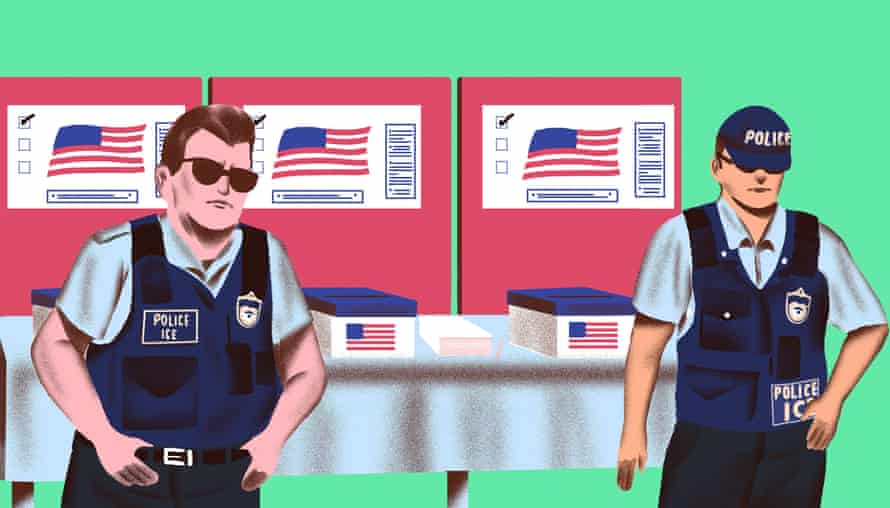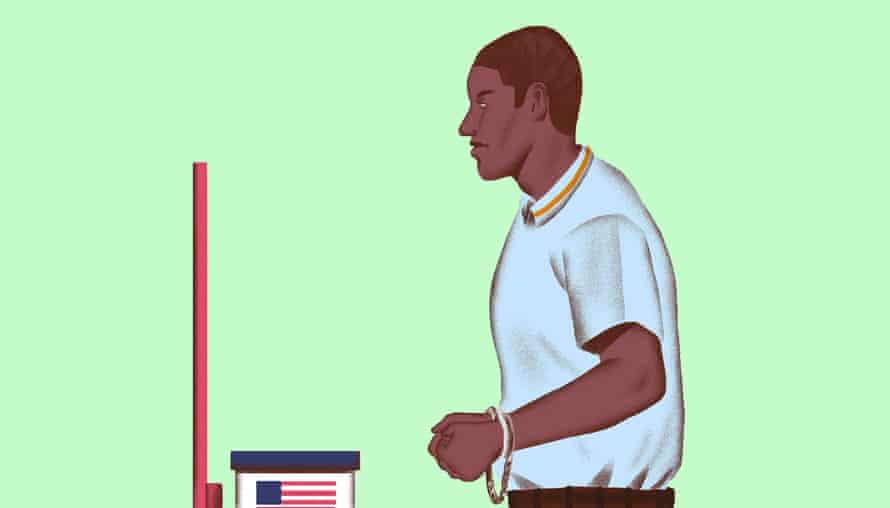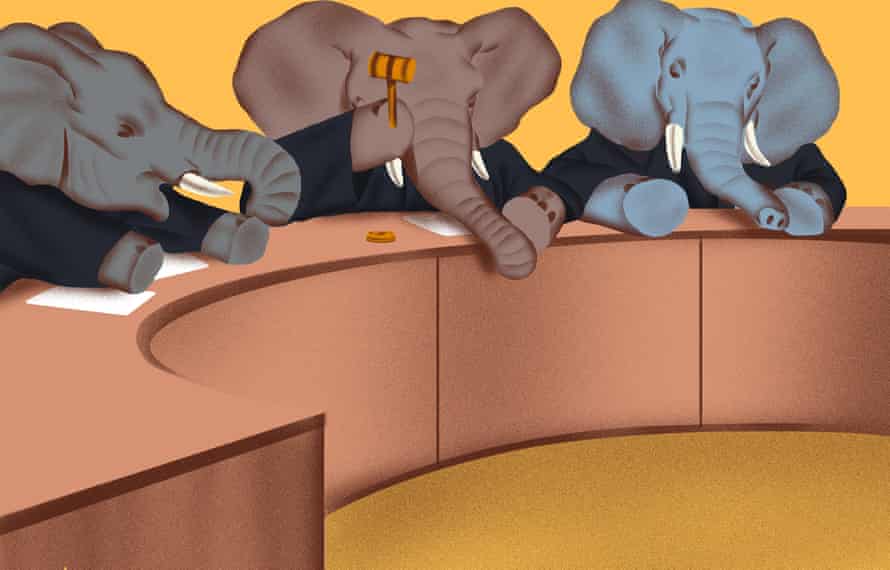How Is It Legal To Unregister Registered Voters
A merica hangs in the residue. The elections in November next year volition determine whether the United States continues down the road of disciplinarian dynastic rule or reclaims the work of expanding and improving our republic. Those are the choices.
That expansion was born out of the ceremonious state of war, which left 1.2 one thousand thousand dead or wounded, simply resulted in the 15th amendment, which made clear that the right to vote could not be denied or hampered because of "race, color, or previous condition of servitude." The subsequent struggles led to women'due south correct to vote, opening the franchise to those 18 and over, and the "single most constructive piece of civil rights legislation ever passed past Congress," the Voting Rights Deed, which protected the franchise from states with a demonstrated history of racial and linguistic discrimination.
Only in 2013, the supreme court alleged that racism was essentially a affair of the past and gutted the Voting Rights Act. The results accept been calamitous. More than half the states passed a series of voter suppression laws that targeted minority voters, breached a primal firewall that protected American republic, and greased the pathway to install a human being in the White House whose racism, greed, and unfitness for office was well known.
What'due south become clear over the course of three harrowing years is that the just real effective throttle that has slowed down the nation's descent into authoritarian dominion has been the throng of engaged, determined voters. The turnout in the 2018 midterm ballot, the highest since 1914, aided by a massive effort of civil rights organizations, was so overwhelming that control of the Business firm of Representatives flipped to the Democrats and accountability finally began to creep back into the political mural. Every bit Benjamin Wittes, senior boyfriend in governance at the Brookings Institution, wrote: "The terminal line of defence force against a lawless, oathless president is the electoral process."
Similarly, the only style that Republicans can protect themselves and a rogue president is to suppress the votes of minorities, the young, and the poor (all of whom vote overwhelmingly for Democrats). In 2020, nosotros're poised to run into more than voter intimidation, criminalizing of voter registration drives, bearded poll taxes, attempts to maintain farthermost partisan gerrymandered districts, draconian and flawed voter roll purges, squashing access to voting on college campuses, widespread purchase of hackable voting machines, and a slew of unqualified, rightwing judges appointed to the federal bench to provide legal sanction to the destruction of democracy.
In One Person, No Vote: How Voter Suppression is Destroying our Democracy, I traced a history and a pattern of bureaucratic violence against American citizens' right to vote. Given what's at stake in 2020, I wait a similar range of tactics, wrapped in the veneer of law, that are designed to further undermine Americans' admission to the ballot box:
Intimidation of minority voters

We're probable to see more abusive utilize of state power to intimidate and criminalize Asian Americans, African Americans and Hispanics for voting or registering minorities to vote. Georgia, in fact, has been notorious in this regard. And continues to be then.
In Texas, meanwhile, acting secretary of state David Whitley announced in January 2019 that he had a list of 95,000 not-citizens (immigrants) who were registered to vote in the state. Worse yet, he claimed, 58,000 of them had already cast a ballot in an election. He speedily turned over the names of these apparent miscreants to Texas' attorney general to pursue criminal prosecution.
Whitley'south claim was, in the end, a prevarication. The listing, as Whitley well knew, was structurally flawed and contained tens of thousands of naturalized citizens who had the correct to vote. Texas, in curt, was getting fix to remove American citizens from the voting rolls simply because they had once been immigrants.
Every bit abhorrent, Whitley's stunt sent the indicate to Texas' burgeoning Hispanic population that if they registered to vote, as their American citizenship immune them to do, their names could easily exist turned over to the attorney general for further investigation. In an era where Ice has been allowed to run loose and terrorize documented and undocumented populations, this was a articulate warning shot. Keep your head downwardly, don't annals, don't vote, and you just might be safe.
It'southward the same message of voter suppression that has haunted America'due south political mural since 1867.
Curbing voter registration

Another tactic, which Tennessee tried subsequently 2018, is to criminalize voter registration drives. Initially, it would seem that a state ranked at the very bottom in the nation in voter turnout and close to the bottom in those registered to vote would try to ameliorate their citizens' participation in democracy. Instead, as the New York Times reported, when "tens of thousands of new blackness and Latino voters were registered in Tennessee in the run-up to the 2018 midterm elections" the Republican-dominated legislature complained that many of the registration forms were incomplete and that the only viable solution was to hold those who held these voter registration drives criminally and financially accountable. Although a judge has struck down the police force, the threat of what Tennessee Republicans are willing to do hangs in that location.
Felon disenfranchisement

Florida has also tried to stem the tide of new voters coming to the polls. Afterwards a denizen-led ballot initiative passed to restore voting rights to 1.4 million felons who had served their sentences, Republicans began searching for some style to neutralize the effect. Given that more than xx% of all African American adults were disenfranchised in Florida because of a felony confidence, and that the overwhelming majority of blacks vote for Democrats, the Republicans added a passenger to "clarify" that a completed sentence required paying all of the court fines, fees, and penalties accrued during the trial and incarceration earlier the returning citizens' voting rights would be restored. No matter how many ways the GOP tried to clothes this up, this was a poll revenue enhancement. It made access to the ballot box solely dependent upon the ability to pay.
A federal judge has temporarily blocked the Florida law. But, he left enough room in his decision that the legislature could tweak, tweak, tweak until it has sowed the kind of confusion near eligibility that depresses voter turnout.
Ballot security issues

While Florida reached back to 19th-century Jim Crow to effort to institute a poll revenue enhancement, other states like Georgia are inviting full-fledged 21st-century hacking to tilt elections. There is already the 127,000 missing votes in the 2018 lieutenant-governor'southward race. That was and then mysterious that experts, but not Georgia's election officials, tracked the discrepancy down to predominantly black precincts on election day. The missing votes did not come from white Democratic-leaning precincts or black precincts where voters used absentee ballots or early voting. The discrepancy happened simply to those in predominantly black precincts, who used the machines on election day. Their votes merely disappeared.
The voting machines used in the 2018 election were easily hackable, had no auditable paper trail, and ran on Windows 2000. As journalist Timothy Pratt noted: "Security vulnerabilities in the state's election system had been repeatedly exposed: by Russian operatives, friendly hackers, and even a Georgia voter who, just days alee of the 2018 midterms, revealed that anyone could get online and gain access to the state's voter registration database."
Georgia has at present rushed to buy new machines, but the state settled on a similarly vulnerable car that does not have a paper trail that the human eye can decipher. Instead, voters get a slip of paper with a barcode that is no more legible than that on a can of soup at the grocery store. Moreover, the state ignored the warnings of scientists from the National University of Sciences, Stanford, Georgia Tech, and Yale, who raised serious concerns about the cybersecurity of the voting apparatuses.
While multiple states are spending over a hundred million dollars on this flawed equipment, Republicans have refused to enact ballot security legislation, even equally Vladimir Putin, when asked if Russia will interfere in the 2020 elections, "jokes", fifty-fifty taunts, that: "I'll tell you a hole-and-corner: yes, we'll definitely do it." Given that Russian cyberattacks in 2016 targeted African Americans and voting systems in all fifty states, this bodes ill for 2020.
Partisan courthouses

The final, and overarching ominous sign is Senate Republicans' determination to pack the federal courts with judges, more of whom than always before have been rated "unqualified" past the American Bar Association and whose simply expertise is hostility to civil rights, including the right to vote. Equally Dahlia Lithwick wrote, this is a "dangerous game of 'How Many More Judges Tin can They Ram Through Before Democracy Breaks?'"
So far, the federal courts have beat dorsum the about egregious voter suppression tactics, like Tennessee'south voter registration law, but if the Republicans can hold on to the Senate after 2020, the federal judiciary will hit a tipping signal that will eviscerate what'south left of this democracy.
We've been hither before. After the civil state of war, the supreme court gutted the constitutional amendments defining citizenship, due process, and the right to vote. It took more than than 100 years, numerous legal battles, and an epic ceremonious rights movement to recover from that debacle.
Merely like an ageing boxer whose taken besides many blows, the United States doesn't have another 100 years to waste material on destroying democracy. We can, however, save it in 2020.
-
Carol Anderson is the Charles Howard Candler Professor of African American Studies at Emory Academy, a Guardian contributor, and the writer of White Rage: The Unspoken Truth of Our Racial Divide and I Person, No Vote: How Voter Suppression is Destroying Our Democracy.
How Is It Legal To Unregister Registered Voters,
Source: https://www.theguardian.com/us-news/2019/nov/13/voter-suppression-2020-democracy-america
Posted by: stevensonbeforming.blogspot.com


0 Response to "How Is It Legal To Unregister Registered Voters"
Post a Comment